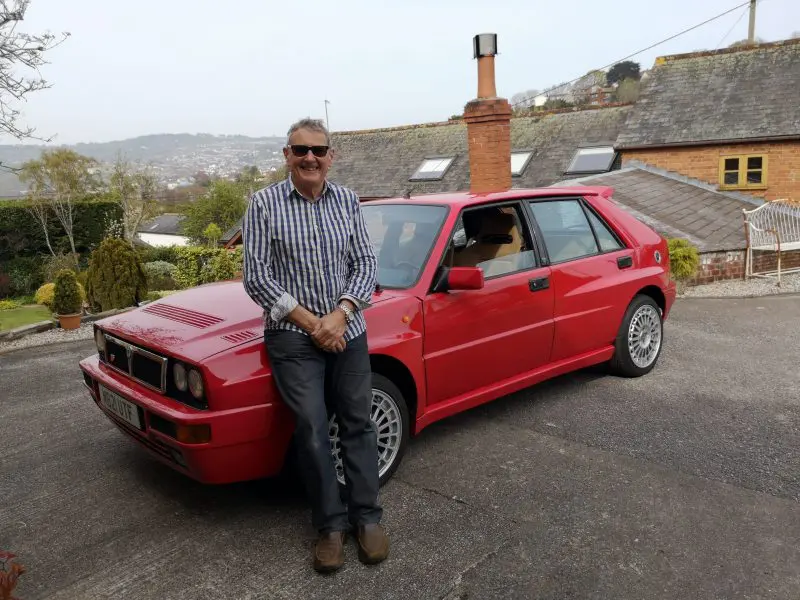- Posted: 23 March 2020
- Tagged: Prostate Cancer Stories
Alex’s Story: Lucky and Unlucky
Alex Grenfell shares his experience of prostate cancer
“So what have I learnt from all this? One overriding thing is the kindness and professionalism of all the NHS staff who helped me. I think this sits beside the importance of strong support from family and friends.
Alex Grenfell
Diagnosis
I was diagnosed with Bowel Cancer, and operated on in 2017. It was at a relatively early stage, and I came out of that experience in good shape. My father passed away 25 years ago from late stage prostate cancer, so I was already aware that I was also at a higher risk of developing this disease. I had two digital checks and PSA blood tests. Following a slightly rising trend on the latter, I had an MRI scan in August 2018. As I had no other symptoms I was convinced that everything would be fine. When I had the results some weeks later I was really quite shocked. Surely this cannot be right? This feeling was heightened after the biopsy. Basically, I had locally advanced prostate cancer, an aggressive form, T3, Gleason 9 (4+5) – what on earth did all this mean?
Somewhat oddly I felt very aggrieved, annoyed even, that here I was facing a second, and more serious, cancer diagnosis less than 18 months after the first one. I didn’t feel frightened as such, but apprehensive. You can read all the booklets, speak to people etc. but, in the end each ‘journey’ is a personal one. That’s not just emotionally, but also physically. How is my body going to deal with all this stuff? Frankly, I had no idea.
The beginning of the journey...
And so the journey started. I was put on hormone therapy treatment almost immediately.
Waiting for the result of a bone scan was particularly difficult. It was all clear, with no spread – an enormous relief! The family, including our son who lives in Canada, were over the moon…Wow, the emotion of it all. Already, the highs and lows that can and will arise were there. More to come undoubtedly!
The early proposals for treatment from our oncology consultant were, following the hormone therapy, two forms of radiotherapy- brachytherapy and external beam. That doesn’t sound so bad was my initial reaction, despite having little real understanding of the implications! However, before that even started, our consultant proposed the addition of chemotherapy, to which I thought ‘oh no I don’t like the sound of that…’ The proposal was based on experiences from the STAMPEDE trial, and statistics indicated an improvement in outcome. My daughter, a doctor, said firmly ‘Dad you’ve got to do it!’ In a slightly bizarre way I felt encouraged that I was deemed to be fit enough, even at age 71, to be able to cope with all that was being proposed.
Chemotherapy
So began the real part of the journey with chemo, Docetaxel to be precise. The first session of six, every 3 weeks, was the most daunting psychologically, despite all the ward staff being absolutely brilliant. There was no pain, it was just the thought of sitting there having poison pumped into you; that was difficult. In addition to that I added to my own pain by having a cold cap to minimise hair loss. That really is a tough call with the ice cold cap at around -5oC strapped tightly to your head for up to 2 hours. But we did it, my wife Carole beside me each time. So, nearly 4 months later the chemo was done. I was relatively lucky as whilst not the most pleasant experience, I got through OK.
Radiotherapy
Next stop a few weeks later was the HDR brachytherapy, together with the relatively new procedure of the gel spacer, to minimise the impact of radiotherapy. Brachytherapy is a fascinating and amazing process but, yet again, left me relatively unscathed, if not a bit sore in the treatment area! So, last up was the external beam radiotherapy. For some reason, the name belies its potential impact. I had 23 sessions and it left me feeling very tired for a while after it was finished, but again no other adverse effects.
Lucky and Unlucky
This was all going on in 2019, and here I am now in February 2020 feeling pretty much back to normal, and my fitness is good. I cycle, walk, do work outdoors etc. The expression ‘all’s well that ends well’ is particularly apt, albeit I have to accept that each ongoing PSA blood test will determine that.
So what have I learnt from all this? One overriding thing is the kindness and professionalism of all the NHS staff who helped me. I think this sits beside the importance of strong support from family and friends. Beyond that, it’s clear that a timely initial diagnosis is very much a lottery. In my case 6 -12 months earlier might have made the journey easier. Months later could have spelled something far more serious.
“Finally I really consider myself both lucky and unlucky, because it has to be pretty unlucky to get two cancers in two years. But on the other hand I’m so lucky to have come through it without major implications.
Alex Grenfell
Patient Voice
If you have been affected by prostate cancer and would like to share your experiences, email [email protected] for more information.
